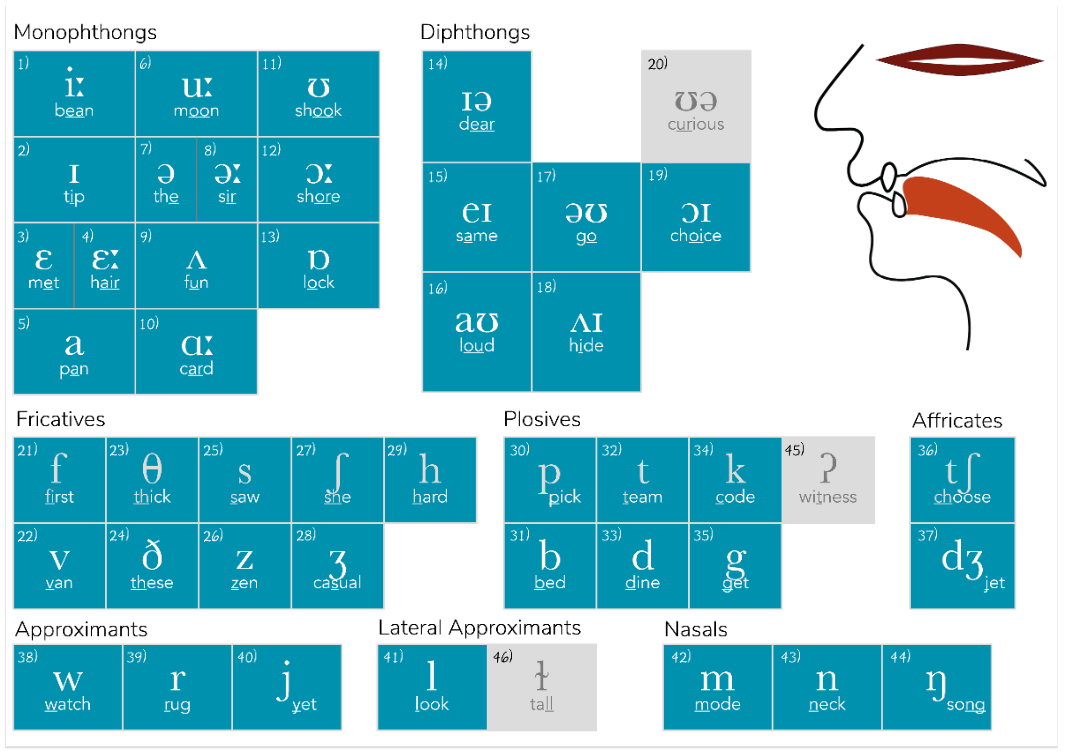Learn about English.

0. Phonetic Symbols Table
| Vowels | Notes | Diphthongs | Notes | Consonants (Voiced) | Notes | Consonants (Voiceless) | Notes |
|---|---|---|---|---|---|---|---|
/ɪ/ |
As in bit | /ɪə/ |
As in ear | /b/ |
Voiced bilabial stop (as in bat) | /p/ |
Voiceless bilabial stop (as in pat) |
/i:/ |
As in see | /eə/ |
As in air | /d/ |
Voiced alveolar stop (as in dog) | /t/ |
Voiceless alveolar stop (as in top) |
/e/ |
As in met | /eɪ/ |
As in say | /dʒ/ |
Voiced affricate (as in judge) | /t∫/ |
Voiceless affricate (as in church) |
/ə/ |
Schwa, as in sofa | /ɔɪ/ |
As in boy | /g/ |
Voiced velar stop (as in go) | /k/ |
Voiceless velar stop (as in cat) |
/ɜ:/ |
As in bird | /aɪ/ |
As in my | /v/ |
Voiced labiodental fricative | /f/ |
Voiceless labiodental fricative |
/ʊ/ |
As in put | /əʊ/ |
As in go | /ð/ |
Voiced dental fricative (this) | /θ/ |
Voiceless dental fricative (thin) |
/u:/ |
As in food | /aʊ/ |
As in now | /z/ |
Voiced alveolar fricative (zoo) | /s/ |
Voiceless alveolar fricative (sun) |
/ɒ/ |
As in hot | /ʊə/ |
As in tour | /ʒ/ |
Voiced palatal fricative (vision) | /∫/ |
Voiceless palatal fricative (she) |
/ɔ:/ |
As in call | /m/ |
Voiced bilabial nasal (man) | /h/ |
Voiceless glottal fricative (hat) | ||
/ʌ/ |
As in cup | /n/ |
Voiced alveolar nasal (net) | /l/ |
Voiceless lateral approximant | ||
/ɑ:/ |
As in car | /ŋ/ |
Voiced velar nasal (sing) | /r/ |
Voiceless alveolar approximant | ||
/æ/ |
As in cat | /w/ |
Voiced bilabial approximant (wet) | /j/ |
Voiceless palatal approximant (yes) |
1. American Intonation
1.1. The American Speech Music
Americans tend to speak without moving their lips too much, focusing on sounds produced with the tongue in the throat.Like to Jazz.
-
Do not speak word by word.
-
Connect words to form sound group.
- Bob is on the phone [bäbizän the foun]
-
Use staircase intonation.
- Word ending in an unvoiced consonant -(t,k,s,x,f,sh), the preceding vowel is said quite quickly, and on a single stair step.
- Word ending in a voiced consonant -(b,d,g,z,zh,j), the preceding vowel is said more slowly, and on a double stair step.
-
Three ways to make intonation:
- Get louder or raise the volume
- Streeeeeetch the word out or lengthen the word that we want to draw attention to.
- **Change pith **(pausing just before changing the pitch)
1.2. Staircase Intonation
1.2.1 Nouns
- Intonation or pitch change is primarily used to introduce new information. So, when we are making a statement for the first time, we will stress the nouns.
1.2.2 Pronouns
- Stress the verb as pronouns are old information.
Dogs bones
///// eat //////
They ///// them
////////////////
1.2.3 Question
- A question rises a little higher than a statement with the same intonation pattern.
"Here is my car."
Here ca
///// is ///// ar
///////// my //////////
///////////////////////
"Where is my car ?"
car
/////
Where /////
///// is /////
///////// my /////
//////////////////
1.2.4 New Information/ Opinion/ Contrast/ “Can’t”
- It sounds like rain.
- Duh-duh-duh rain | It sounds like rain.
Duh ray
///// duh ///// ayn.
///// ///// duh ///// /////
///// ///// ///// ///// /////
- Make rain every musical and put it on two notes: ray-ayn.
- It sounds like rain. (It’s rain)
- It sounds like rain. (It’s not)
- He likes rain, but he hates snow.
- Like and hate are contrasted and are the stronger words.
- It can’t rain when there’re no clouds.
- Contractions (shouldn’t, wouldn’t) and negatives (no, not, never) are important words since they totally negate the meaning of a sentence, but they are not usually stressed. Can’t is the exception.
It was pretty good. (She liked it.) It was pretty good. (She didn’t like it much.)
2. Intonation Patterns
fall rising
2.1. Falling
-
To talk about something which will definitely happen or that is complete:
- I have to work.
-
WH questions:
- Why do you study English ?
2.2. Rising
-
Yes/No question:
- Did they call?
-
Alternative questions: When you have
orin a question, that’s an alternative question.- Are they coming or going ?
2.3. Fall-rising
-
Something is incomplete, we are uncertain of something or we still want to continue the sentence and it is not finished yet.
- I don’t play tennis, but I like watching it!
-
We can have fall-rise intonation separately on 2 different words.
- She is quite a good teacher, but she’s a bit old.